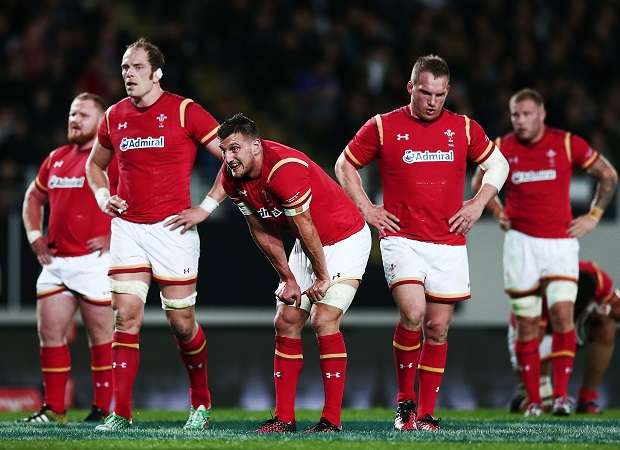
Across the Tasman, a golden Wallaby made the same point in brutally frank fashion. “This New Zealand team will wipe the floor with Wales,” said Matt Burke, an Australian World Cup winner in Cardiff in 1999.“And that’s a given.”
A multitude of Welsh fans, conditioned to routine beatings south of the Equator and demoralised by the Twickenham implosion the previous week, would have nodded in private acknowledgement of both prophecies. The way they saw it, Eden Park would be another familiar early morning exercise in taking refuge behind the sofa.
Sam Warburton’s promise that this time it would be different tended to be lost in the midst of the All Black hype. As a way of letting the opposition know what was coming their way, the returning Wales captain borrowed the famous words of the SAS: “He who dares, wins.”
They dared so effectively for so long that Welshmen, and women, the world over began to dream that the impossible was about to happen. They had turned Cullen’s rhetoric upside down and flung it back in his face: “Can the All Blacks live with Wales…?”
They began asking the question as early as the ninth minute when the All Blacks, stretched to the far right touchline, had nobody at home in the left corner after Wales again used the full width of the pitch for Taulupe Faletau’s exhilarating try.
A punishingly swift riposte in the shape of two tries within four minutes raised the All Black spectre of the hapless challenger being stopped well inside the distance. Far from capitulating, Wales were ahead again after half an hour and asking the same impudent question: “Can you live with us?”
For more than an hour they defied the odds in pursuit of the impossible, of turning the Garden of Eden into a Welsh paradise. It was as if they had been inspired by Muhammad Ali and how, faced by his own supposed mis-match against Sonny Liston, he had ‘shaken the world’ by putting the fearsome champion flat on his back.
The All Blacks were still in danger of being reduced to the same horizontal state going into the final quarter of an exhilarating Test match. Like Liston more than half a century ago, they had been caught unawares by opponents with the audacity to play them at their own game.
They rattled their cage so often that the Kiwis dropped the ball twice as often as their opponents. Unlike Liston, the champions recovered from their bewilderment to take a points verdict which had been in doubt for far longer than they could have imagined.
So what happened? How did the best in the world have so much trouble seeing off the second best in Britain? It happened because, at long last, Wales broke out of their Six Nations strait-jacket and unleashed their runners.
At times, even the All Blacks found them irresistible and nobody more so than Liam Williams. A scaffolder by trade before discovering a slightly more glamorous occupation, he never missed a trick to build what might have been a stairway to heaven.
He made the All Blacks look like rabbits trapped in the dazzle of his lights, never more so than the run from deep to put the second Welsh try on the proverbial plate for Rhys Webb. Quite why Warren Gatland had him substituted 15 minutes from time with the match still in the balance took some understanding.
It brought a premature end to surely the finest attacking performance from a Welsh full-back for a very long time, perhaps since the teenaged Lewis Jones announced himself by giving England the runaround on debut at Twickenham in 1950.
Others, like George North, Taulupe Faletau and Jamie Roberts, played their part in ensuring Wales matched New Zealand line-break for line-break, nine in total with the lion’s share from Williams.
He, above all, epitomised Welsh expression and freedom, so effective but so overdue that it begs the question why it took them so long to find an enlightened alternative to the tedious predictability of bashing it up the middle. In doing so they contributed hugely to a magnificent match.
Who could have imagined that at half-time, the team saved by the bell were wearing black. Spreadeagled over the ropes in the face of a Welsh onslaught, they survived thanks to Aaron Smith’s artful piece of obstruction to deny Jonathan Davies a simple touch down and enable Aaron Cruden to get their first.
Wayne Barnes referred it to the TMO, then gave Wales a five-metre scrum instead of a penalty try. Had Wales led by ten points instead of three, it would have been no more than they deserved.
Far from subsiding, they were still asking the same question when it took a tackle above and beyond the call of duty from Beauden Barrett to prevent a galvanised North careering over.
By then Cullen and Burke ought to have been suffering from a severe bout of indigestion caused by having to eat their own words, and I write from personal experience.
While Wales were lucky to be reprieved by Barnes’ overruling the TMO in disallowing a late try for a forward pass which left Cruden suitably peeved, they had at least done what they had singularly failed to do, give the All Blacks a serious run for their money at home.
A converted try in stoppage time gave the scoreline a distorted look, an 18-point deficit which still made this the closest Wales have ever come to winning in New Zealand. The trick now is to produce more of the same in Wellington next Saturday.






















